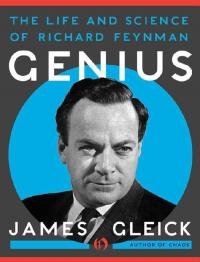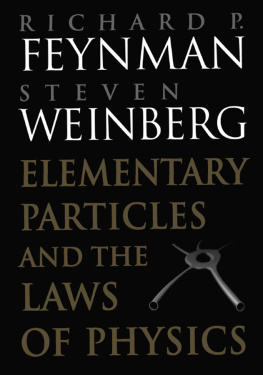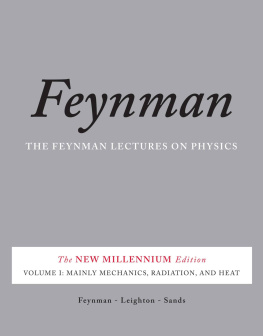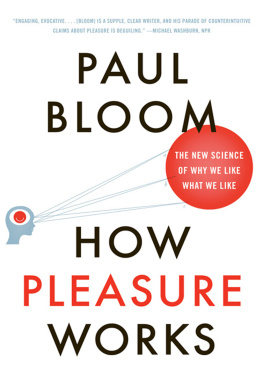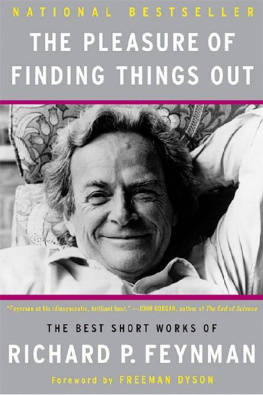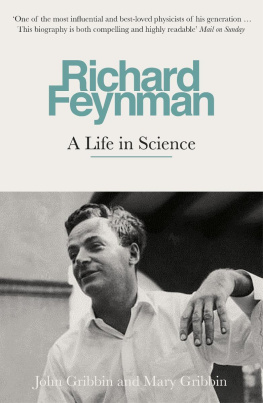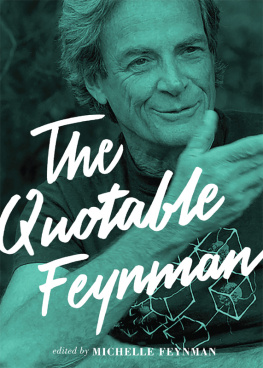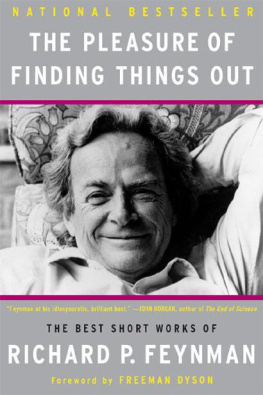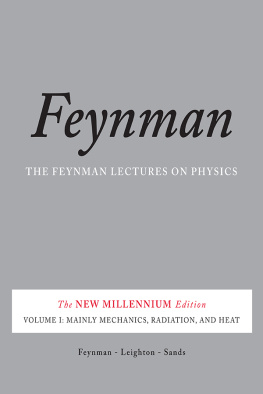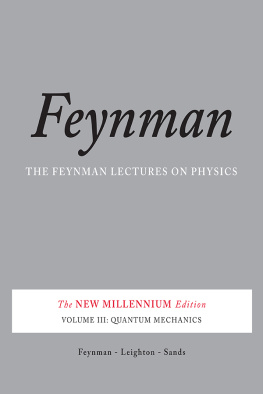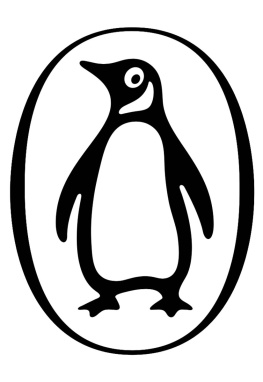THE PLEASURE OF
FINDING THINGS OUT
Also by Richard P. Feynman
The Character of Physical Law
Elementary Particles and the Laws of Physics:
The 1986 Dirac Memorial Lectures (with Steven Weinberg)
Feynman Lectures on Computation
(edited by Anthony J. G. Hey and Robin Allen)
Feynman Lectures on Gravitation
(with Fernando B. Morinigo and William G. Wagner; edited by Brian Hatfield)
The Feynman Lectures on Physics
(with Robert B. Leighton and Matthew Sands)
The Meaning of It All: Thoughts of a Citizen-Scientist
Photo-Hadron Interactions
Perfectly Reasonable Deviations from the Beaten Track:
The Letters of Richard P. Feynman
QED: The Strange Theory of Light and Matter
Quantum Mechanics and Path Integrals (with A. R. Hibbs)
Six Easy Pieces:
Essentials of Physics Explained by Its Most Brilliant Teacher
Six Not-So-Easy Pieces:
Einsteins Relativity, Symmetry, and Space-Time
Statistical Mechanics: A Set of Lectures
Surely Youre Joking, Mr. Feynman!
Adventures of a Curious Character (with Ralph Leighton)
The Theory of Fundamental Processes
What Do You Care What Other People Think?
Further Adventures of a Curious Character
(with Ralph Leighton)
THE PLEASURE OF
FINDING THINGS OUT
The Best Short Works of
Richard P. Feynman
RICHARD P. FEYNMAN
Edited by
Jeffrey Robbins
Foreword by
Freeman Dyson

A MEMBER OF THE PERSEUS BOOKS GROUP
NEW YORK
Copyright 1999 by Michelle Feynman and Carl Feynman
Editors introduction, chapter introductions, and footnotes copyright 1999 by Jeffrey Robbins
Originally published by Perseus Publishing Published by Basic Books, A Member of the Perseus Books Group
All rights reserved. Printed in the United States of America. Published simultaneously in Canada. No part of this book may be reproduced in any manner whatsoever without written permission except in the case of brief quotations embodied in critical articles and reviews. For information, address Basic Books, 387 Park Avenue South, New York, NY 10016-8810.
Acknowledgments for previously published material appears on page 259.
A CIP record for this book is available from the Library of Congress.
ISBN-13 978-0-465-02395-0
ISBN-10 0-465-02395-9
Set in 11-point Berthold Garamond
Books published by Basic Books are available at special discounts
for bulk purchases in the U.S. by corporations, institutions, and other
organizations. For more information, please contact the Special Markets
Department at the Perseus Books Group, 11 Cambridge Center,
Cambridge, MA 02412, or call (800) 255-1514 or (617) 252-5298,
or e-mail .
10 9 8
CONTENTS
THIS SIDE IDOLATRY
by Freeman Dyson
I did love the man this side idolatry as much as any, wrote Elizabethan dramatist Ben Jonson. The man was Jonsons friend and mentor, William Shakespeare. Jonson and Shakespeare were both successful playwrights. Jonson was learned and scholarly, Shakespeare was slapdash and a genius. There was no jealousy between them. Shakespeare was nine years older, already filling the London stage with masterpieces before Jonson began to write. Shakespeare was, as Jonson said, honest and of an open and free nature, and gave his young friend practical help as well as encouragement. The most important help that Shakespeare gave was to act one of the leading roles in Jonsons first play, Every Man in His Humour, when it was performed in 1598. The play was a resounding success and launched Jonsons professional career. Jonson was then aged 25, Shakespeare 34. After 1598, Jonson continued to write poems and plays, and many of his plays were performed by Shakespeares company. Jonson became famous in his own right as a poet and scholar, and at the end of his life he was honored with burial in Westminster Abbey. But he never forgot his debt to his old friend. When Shakespeare died, Jonson wrote a poem, To the Memory of My Beloved Master, William Shakespeare, containing the well-known lines:
He was not of an age, but for all time.
And though thou hadst small Latin and less Greek,
From thence to honor thee, I would not seek
For names, but call forth thundering Aeschylus,
Euripides and Sophocles,...
To live again, to hear thy buskin tread.
Nature herself was proud of his designs,
And joyed to wear the dressing of his lines,...
Yet I must not give Nature all: Thy art,
My gentle Shakespeare, must enjoy a part.
For though the poets matter nature be,
His art does give the fashion; and, that he
Who casts to write a living line, must sweat,...
For a good poets made, as well as born.
What have Jonson and Shakespeare to do with Richard Feynman? Simply this. I can say as Jonson said, I did love this man this side idolatry as much as any. Fate gave me the tremendous luck to have Feynman as a mentor. I was the learned and scholarly student who came from England to Cornell University in 1947 and was immediately entranced by the slapdash genius of Feynman. With the arrogance of youth, I decided that I could play Jonson to Feynmans Shakespeare. I had not expected to meet Shakespeare on American soil, but I had no difficulty in recognizing him when I saw him.
Before I met Feynman, I had published a number of mathematical papers, full of clever tricks but totally lacking in importance. When I met Feynman, I knew at once that I had entered another world. He was not interested in publishing pretty papers. He was struggling, more intensely than I had ever seen anyone struggle, to understand the workings of nature by rebuilding physics from the bottom up. I was lucky to meet him near the end of his eight-year struggle. The new physics that he had imagined as a student of John Wheeler seven years earlier was finally coalescing into a coherent vision of nature, the vision that he called the space-time approach. The vision was in 1947 still unfinished, full of loose ends and inconsistencies, but I saw at once that it had to be right. I seized every opportunity to listen to Feynman talk, to learn to swim in the deluge of his ideas. He loved to talk, and he welcomed me as a listener. So we became friends for life.
For a year I watched as Feynman perfected his way of describing nature with pictures and diagrams, until he had tied down the loose ends and removed the inconsistencies. Then he began to calculate numbers, using his diagrams as a guide. With astonishing speed he was able to calculate physical quantities that could be compared directly with experiment. The experiments agreed with his numbers. In the summer of 1948 we could see Jonsons words coming true: Nature herself was proud of his designs, and joyed to wear the dressing of his lines.


